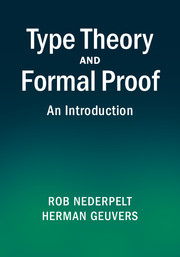Book contents
- Frontmatter
- Contents
- Foreword
- Preface
- Acknowledgements
- Greek alphabet
- 1 Untyped lambda calculus
- 2 Simply typed lambda calculus
- 3 Second order typed lambda calculus
- 4 Types dependent on types
- 5 Types dependent on terms
- 6 The Calculus of Constructions
- 7 The encoding of logical notions in λC
- 8 Definitions
- 9 Extension of λC with definitions
- 10 Rules and properties of λD
- 11 Flag-style natural deduction in λD
- 12 Mathematics in λD: a first attempt
- 13 Sets and subsets
- 14 Numbers and arithmetic in λD
- 15 An elaborated example
- 16 Further perspectives
- Appendix A Logic in λD
- Appendix B Arithmetical axioms, definitions and lemmas
- Appendix C Two complete example proofs in λD
- Appendix D Derivation rules for λD
- References
- Index of names
- Index of definitions
- Index of symbols
- Index of subjects
10 - Rules and properties of λD
Published online by Cambridge University Press: 05 November 2014
- Frontmatter
- Contents
- Foreword
- Preface
- Acknowledgements
- Greek alphabet
- 1 Untyped lambda calculus
- 2 Simply typed lambda calculus
- 3 Second order typed lambda calculus
- 4 Types dependent on types
- 5 Types dependent on terms
- 6 The Calculus of Constructions
- 7 The encoding of logical notions in λC
- 8 Definitions
- 9 Extension of λC with definitions
- 10 Rules and properties of λD
- 11 Flag-style natural deduction in λD
- 12 Mathematics in λD: a first attempt
- 13 Sets and subsets
- 14 Numbers and arithmetic in λD
- 15 An elaborated example
- 16 Further perspectives
- Appendix A Logic in λD
- Appendix B Arithmetical axioms, definitions and lemmas
- Appendix C Two complete example proofs in λD
- Appendix D Derivation rules for λD
- References
- Index of names
- Index of definitions
- Index of symbols
- Index of subjects
Summary
Descriptive versus primitive definitions
As we have explained before, our intention is to switch over from λC to an extended formal system with definitions that can be fruitfully used for the formalisation of mathematical texts (including logic).
In the previous chapter we have defined the system λD0, an extension of λC with definitions as ‘first class citizens’. We have based λD0 on so-called descriptive definitions. The word ‘descriptive’ means that each defined constant is connected to an explicit definiens, giving a formal description of what the constant represents. The new name (the constant), so to say, ‘stands for’ the ‘describing’ expression to which it has been coupled in its definition.
When it comes to mathematics (and logic) in general, there is still one thing that we miss: the possibility to express so-called primitive notions, necessary for the incorporation of axioms and axiomatic notions. These appear as soon as we go beyond the so-called constructive logic (cf. Sections 7.4 and 11.8), or when we incorporate mathematics in a style based on axioms, as often happens.
The constants introduced in primitive definitions – as opposed to those in descriptive definitions – are not accompanied by a descriptive expression. These so-called primitive constants are only provided with a type to which the constant belongs, but there is no further restriction or characterisation. Consequently, primitive constants cannot be unfolded, simply because there is nothing to unfold them to.
- Type
- Chapter
- Information
- Type Theory and Formal ProofAn Introduction, pp. 211 - 224Publisher: Cambridge University PressPrint publication year: 2014



